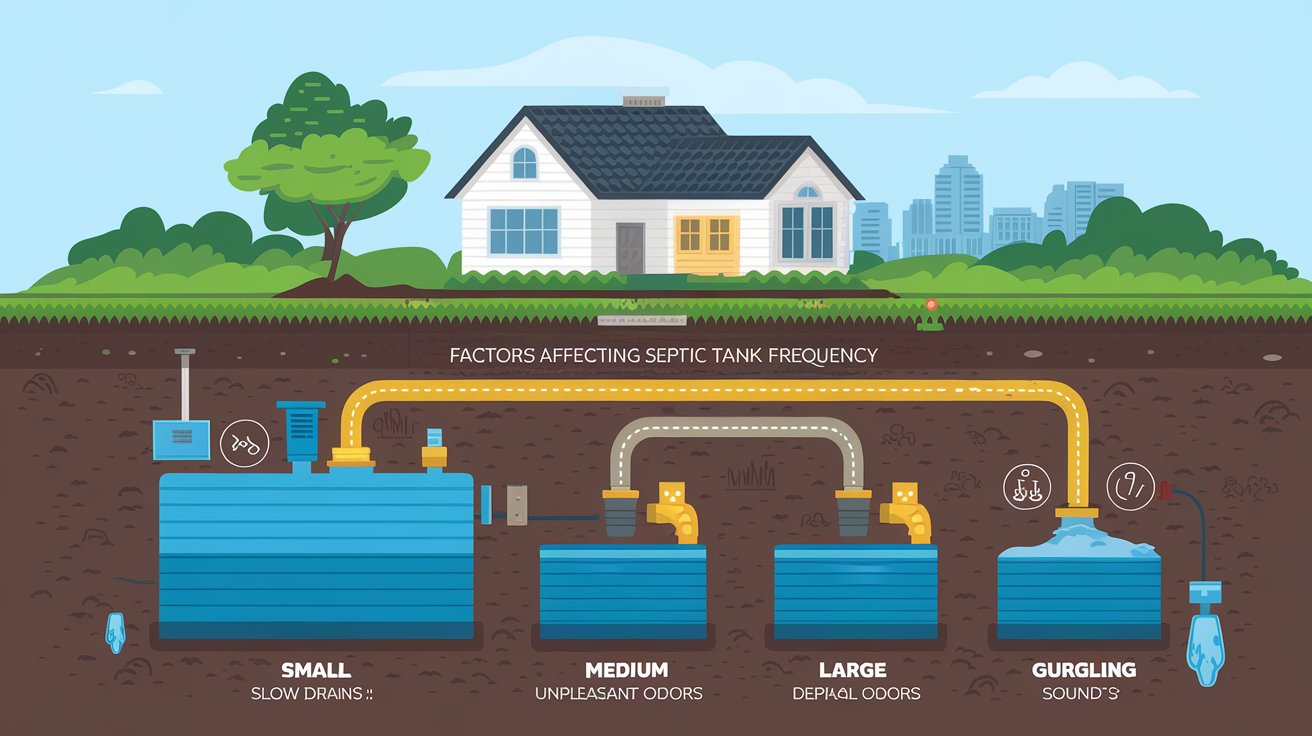Understanding the septic tank pumping frequency is essential for keeping your system running smoothly. Whether you’re a new homeowner or have lived off the grid for years, regular pumping is the key to avoiding backups, foul odors, and costly repairs. Septic systems (also called onsite wastewater treatment systems or private sewage systems in some regions) need consistent maintenance—just like any major home system.
But how often should you schedule septic tank pumping? The answer depends on several factors, including your household size, tank capacity, and water usage habits. In this guide, we’ll explore those factors in depth and give you a reliable framework to follow.
Table of Contents
- What Is Septic Tank Pumping?
- How Often Should You Pump Your Septic Tank?
- Signs You Need to Pump Sooner
- Factors That Affect Septic Pumping Frequency
- Why Regular Pumping Matters
- Tips to Extend Time Between Pumpings
- Regional Differences in Septic Maintenance
- Contact Info and Resources
- Conclusion: Stay Ahead of Septic Trouble
- Septifix Power for Your Septic System
What Is Septic Tank Pumping?
Septic tank pumping is the process of removing solid waste, sludge, and scum that accumulate in your tank over time. When your tank becomes too full, it can’t properly separate solids from liquids. That’s when problems start—like slow drains, sewage smells, or even wastewater backing up into your home.
A licensed septic professional uses a vacuum truck to remove the contents of the tank and dispose of them safely. It’s a routine but essential task for maintaining a healthy and safe system.
How Often Should You Pump Your Septic Tank?
General Guidelines
A good rule of thumb is to pump your septic tank every 3 to 5 years. However, this is just a general estimate. Your ideal pumping schedule depends on:
- Household size
- Septic tank size
- Daily water usage
- System age and condition
- Use of garbage disposals or high-efficiency appliances
Example Pumping Frequencies Based on Household Size
| Household Size | Tank Size (Gallons) | Pumping Frequency |
|---|---|---|
| 1–2 people | 1,000 | Every 5 years |
| 3–4 people | 1,000 | Every 3–4 years |
| 5+ people | 1,000 | Every 2–3 years |
| 3–4 people | 1,500 | Every 4–5 years |
Note: These are estimates. Your local septic professional can provide personalized guidance based on system inspections and sludge measurements.
Signs You Need to Pump Sooner
Even if you’re on a schedule, some signs indicate it’s time to pump your septic tank early:
- Slow-draining sinks or toilets
- Sewage odors around your property
- Pooling water near the drainfield
- Gurgling pipes or backup in plumbing fixtures
Ignoring these red flags can lead to system overload and even total failure.
Factors That Affect Septic Pumping Frequency
1. Household Water Usage
If your household uses more water than average—say, with frequent laundry loads, long showers, or an in-home business—you’ll fill the tank more quickly.
💡 Pro Tip: Installing low-flow fixtures and fixing leaks can extend your pumping intervals.
2. Tank Size and Type
Larger tanks naturally hold more waste and can go longer between pump-outs. If you have an aerobic septic system or mound system, maintenance needs may differ. Always follow the manufacturer’s and installer’s recommendations.
3. Use of Garbage Disposals
Using a garbage disposal sends extra solids to the tank, which can reduce time between pumpings. If you rely on one often, consider pumping more frequently.
4. Number of Occupants
More people = more water = faster tank filling. A home that occasionally hosts guests may require pumping sooner than expected.
Why Regular Pumping Matters
Skipping septic pumping isn’t just risky—it’s expensive. A failed system can cost $5,000 to $15,000 to repair or replace. On the other hand, routine pumping costs between $300–$600, depending on location and tank size.
Key Benefits of Routine Pumping:
- Extends the lifespan of your system
- Prevents backups and drainfield failure
- Saves money over time
- Reduces environmental contamination risks
Tips to Extend Time Between Pumpings
- Avoid flushing anything but toilet paper and human waste
- Use septic-safe cleaners (no bleach or antibacterial chemicals)
- Spread out laundry loads throughout the week
- Have your tank inspected annually
Check out our guide on Household Cleaners Safe for Septic Systems for more product tips.
Regional Differences in Septic Maintenance
In some areas—like rural Midwest farms, Florida’s sandy coasts, or Pacific Northwest woodlands—soil type, water tables, and local codes may affect pumping needs. For instance:
- Wisconsin: State code requires regular inspections and records
- Florida: Shallow water tables can cause quicker fill-up
- Texas: Many rural areas have large tanks but higher usage rates
Always check with your local health department or county septic authority for specific regulations.
Contact Info and Resources
Want to know the ideal septic tank pumping schedule for your home? Here are a few helpful places to start:
- EPA SepticSmart Program – Tips and maintenance tools
- National Onsite Wastewater Recycling Association (NOWRA) – Trusted resource for septic professionals
- How to Check Septic Tank Levels – DIY guide for monitoring your system
- Florida Septic Regulations – State-specific rules and maintenance tips
- DIY Emergency Septic Fixes – What to do when problems strike
Conclusion: Stay Ahead of Septic Trouble
Knowing your septic tank pumping frequency is one of the smartest ways to protect your home, health, and wallet. While the “every 3 to 5 years” rule works for many, your household may need more frequent care. Watch for signs of trouble, reduce waste where you can, and get regular inspections.
Don’t wait for a septic emergency. Contact a local professional to schedule your next pumping—and keep your system flowing for years to come.
Septic Tanks in Rural Areas: A Practical Guide for Homeowners
Directory | Wyoming Septic Service Providers : Best Professionals
Directory | Wisconsin Septic Service Providers | Part 3
Directory | Wisconsin Septic Service Providers | Part 2
Directory | Wisconsin Septic Service Providers | Part 1
Directory | West Virginia Septic Service Providers : Best Professionals
Winter Pumping: Should You or Shouldn’t You?
Septic Installer Registration in Bay County, Michigan
Septifix Power for Your Septic System










